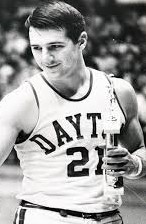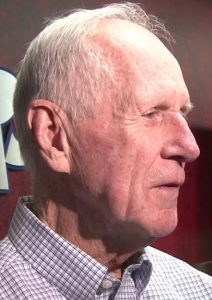If you thought that the history of Dayton basketball started with 2020 national POY Obi Toppin then you need to make a New Year’s resolution to do a little more research! Don May was a hometown hero who started at Belmont High School before walking a few blocks west to become a Flyer in 1964. He helped lead Dayton to the Sweet 16 in 1966, made the NCAA title game in 1967, and was named NIT MVP in 1968. After being drafted 30th overall by the Knicks in 1968 he ended up winning an NBA title in 1970 and was elected to his alma mater’s Hall of Fame in 1974. HoopsHD’s Jon Teitel got to chat with Don’s college coach Don Donoher about his former player and how he remembers him the most. Today is May’s 75th birthday so let us be the 1st to wish him a happy 1!
 (photo credit: archbaroncup.com)
(photo credit: archbaroncup.com)
May played alongside fellow future All-American Bill Hosket at Belmont High School, where they won the 1964 Ohio state AA title and became the 1st teammates ever to be named 1st-team All-Ohio: how dominant was that Belmont team, and how easy was it to convince him to come to Dayton for college after literally growing up next door to the campus on Kiefaber Street? That Belmont team is still considered today as 1 of the best teams in state history. Bill’s father played at Ohio State and Donnie literally grew up with the UD campus as his playground. A lot of schools pursued him but we were very fortunate to get 50% of the Belmont package.
Take me through the 1967 NCAA tourney:
Just to get out of the Midwest Region you needed a 2-PT OT win over Western Kentucky, a 1-PT win over Tennessee, and a 5-PT OT win over Virginia Tech: how did the team have anything left in the tank before facing Coach Dean Smith and UNC in the Final 4? You know how resilient those young guys are! We went to the tourney the previous year and probably had a better team in 1966, but we limped along and proved the power of prayer because we were lucky in all 3 games.
After upsetting the Tar Heels, May had 21 PTS/17 REB in a loss to UCLA in the title game: what was it like to face Lew Alcindor (20 PTS/18 REB)/Coach John Wooden with a title on the line? It was pretty awesome but we were a bit of a no-show to be honest. Now you have a day to prepare but back then the Final 4 was on a Friday and the title game was on a Saturday. Had they not shown us mercy they would have won by 30 PTS. We trailed UNC early before he went on a streak and made 13 consecutive FGs that led us to victory.
In the 1968 NIT title game you beat Kansas and May was named MVP after scoring 22 PTS: how was he able to play his best when it mattered the most? That was just his nature. As much as he could score he took so much pride in being a physical player around the boards with excellent timing. He had a will to win and seemed to rise to the occasion when the moment meant the most: he was a horse. We were supposed to be top-10 in the country but started 7-9 before getting rolling. We were probably the 16th of 16 teams invited but he put us on his shoulders.
He was a 2-time All-American: what did it mean to him to receive such outstanding honors? He is the most humble person you could ever run across. He does not bask in the glory of what he has done: if you spent an evening out with him you would not even know that he played basketball. He never liked the spotlight and is just a great human being.
His career totals of 1980 PTS/1301 REB remain #2 in school history: how was he able to balance his scoring with his rebounding? He was a fine shooter even though he was not viewed as such coming out of Belmont. Donnie did not have a great handle and was not a particularly great passer but he could score around the lane. He was a great rebounder because he was so strong-willed. He was really good at tip-ins due to his timing/desire and was a very good athlete.
In the spring of 1968 he was selected in the 3rd round of the NBA draft by the Knicks and in the 3rd round of the ABA draft by the Pacers: why did he decide to sign with the Knicks, and did he have any regrets? He was single-minded about playing in the NBA. He had an agent out of Chicago named Arthur Morris and they talked about his future.
Despite Jerry West making a 60-foot buzzer-beater at the end of regulation in Game 3 of the 1970 NBA Finals, Willis Reed made a surprise return to the court in Game 7 to inspire New York to win its 1st-ever title: what did it mean to him to win an NBA title? He was very proud of that. He cannot say enough good things about Reed, both what he meant to the team and what a great person he was. There was some pretty good talent on that team besides Reed, including his former teammate Hosket.
In 1974 he was elected to the Dayton Hall of Fame and in 2007 he was elected to the Ohio Basketball Hall of Fame: where do these moments rank among the highlights of his career? He does not talk much about it but it meant a lot to him on the inside.
He has referred to you as his “father figure”: how did your relationship with him change over the past 50 years from coach to mentor/lifelong friend? We are lifelong friends for sure and still talk on the phone a lot. Our 2 families are linked and he came from a great family. His mom worked on campus and he grew up 2 blocks from the Fieldhouse (where he would sneak in to shoot baskets).
When people look back on his career, how do you think that he should be remembered the most? Those who were around him feel that if there was ever a statue built in front of the arena it would have to be Don May. He carried the team to its only Final 4 and was NIT MVP, so it is tough for anyone else to compare to that.



